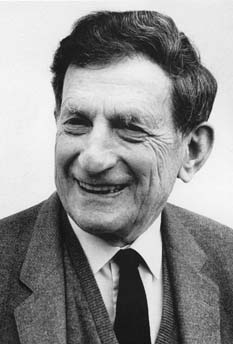David Joseph Bohm FRS[1] (/boʊm/; December 20, 1917 – October 27, 1992) was an American scientist who has been described as one of the most significant theoretical physicists of the 20th century[2] and who contributed unorthodox ideas to quantum theory, neuropsychology and the philosophy of mind.
Bohm advanced the view that quantum physics meant that the old Cartesian model of reality – that there are two kinds of substance, the mental and the physical, that somehow interact – was too limited. To complement it, he developed a mathematical and physical theory of "implicate" and "explicate" order.[3] He also believed that the brain, at the cellular level, works according to the mathematics of some quantum effects, and postulated that thought is distributed and non-localised just as quantum entities are.[4][not in citation given]
Bohm warned of the dangers of rampant reason and technology, advocating instead the need for genuine supportive dialogue, which he claimed could broaden and unify conflicting and troublesome divisions in the social world. In this, his epistemology mirrored his ontology.[5] Due to his Communist affiliations, Bohm was the subject of a federal government investigation in 1949, prompting him to leave the United States. He pursued his scientific career in several countries, becoming first a Brazilian and then a British citizen. He abandoned Marxism in the wake of the Hungarian Uprising in 1956.[6]
Bohm's main concern was with understanding the nature of reality in general and of consciousness in particular as a coherent whole, which according to Bohm is never static or complete but rather an unfolding process.
To continue reading click on the following link:


إرسال تعليق